|
Looking forward to joining Delegate for the 42nd House District in the Commonwealth of Virginia KATHY TRAN; Treasurer of the Democratic Asian Americans of Virginia and 8th District Dems ROSE CHU; Director, NAKASEC Action Fund (and mah friend and neighbor!) SOOKYUNG OH; and Director of the Asian American Pacific Islander Civic Engagement (ACE) Collaborative of New Virginia Majority MITCHELL YANGON in this 12 NN-1:00 PM "FRIDAY POWER LUNCH" AAPI Roundtable on 21 APRIL-- Registration Link is here. Hope you can join us!
0 Comments
Over at the Virginia Poets Database, we have a SPOTLIGHT ON ECOPOETRY from ODU FACULTY AND STUDENTS.
Thanks so much to the writers who contributed their work, and to Karen Vaughan and Tope Larayetan for all their assistance in building this resource. And if you are, or know, a VA Poet, please consider adding (your) information to the database! It's April, which means it's Happy National Poetry Month (NaPoMo) 2023. I hope you'll enjoy coming back here each day this April, for a poetry prompt or two. Happy writing!
* * * 30 April In a poem, explore what it means to outlast or outlive (something or someone). 29 April There are any of a number of human-made or synthetic things that bear some kind of resemblance to a natural thing or object. For instance, a bomb looks like a pomegranate, a grenade like a pine cone or a pineapple; a traffic light like a tray of red, yellow, and green bell peppers; a handheld fan like a ginkgo leaf; a pincushion like a sea urchin. Write a poem in which you incorporate this kind of cross-image-making, which then also serves to add to the poem's subject and "meaning." 28 April Write a poem in which you explore the texture of things, or the texture of some experience. If you can, look for or create a new word or two to capture its distinctness. For instance, throughout her new book, poet Claire Wahmanholm uses the word "meltwater" - which means water formed by the melting of snow and ice, especially from a glacier. 27 April To curate means to organize and present a collection, perhaps according to a theme or the category to which the objects or specimens belong. Write a poem which could be seen to curate a selection of images or material objects that are connected to each other. For example, if you were to write an "Animal Crossing" poem, what would be on your island? 26 April There are some styles of woodworking where no metal is used. There is a Japanese technique called Sashimono, for instance, which (instead of nails or hinges) uses carved mortises and grooves to join parts of furniture so that the surface appears seamless. Sometimes, we use "seamlessness" to describe a quality achieved by art/writing — by which I think we mean that the labor or craft behind the doing of the thing, is not visible. Maybe the lines or images seem to enter the poem as if without effort. Maybe this is what's meant when writers talk about sound and sense being one. But there are also other folk art traditions in which the mistake, the visible seam, is deliberately incuded in the work, sometimes as a way in which the artist(an) might acknowledge that they participate in the greater creative energy of the universe... Write a poem in a form of your choosing, but include a deliberate departure or swerve away from the form. Make that difference not a mistake, but another place in which you can introduce another layer of meaning or experience in the poem. 25 April What words would you say form your (current) poetic vocabulary? Pick one, and write a poem exploring its meanings; let it also move you toward whatever else it suggests. If it works, use this word as the title. 24 April One of the Annie Dillard quotes I come back to often is this one: “One of the things I know about writing is this: spend it all, shoot it, play it, lose it, all, right away, every time. Do not hoard what seems good for a later place in the book or for another book; give it, give it all, give it now. The impulse to save something good for a better place later is the signal to spend it now. Something more will arise for later, something better. These things fill from behind, from beneath, like well water. Similarly, the impulse to keep to yourself what you have learned is not only shameful, it is destructive. Anything you do not give freely and abundantly becomes lost to you. You open your safe and find ashes.” What are a few things you've been keeping/saving for some imagined better time or place in the future? Take them out of the safe and write (about) them. 23 April Write a poem in which you walk an answer (or something you already know) back to a time when you didn't know... What was that like? 22 April What comes to mind when you think of "balm?" Write an ode to what soothes - a burn, a callus, your thirst or sleeplessness. 21 April Does it sometimes feel that you are trying to sing in the darkness, or trying to write poems to celebrate what yet remains to be seen, or is yet to come? During such times, I try to remember that elegy is only the other face of the ode. Write a poem in which someone specific (who is your poem’s persona?) makes amends, rights a wrong, reveals the truth instead of a lie, brings back or returns something that was taken. Write a poem celebrating these gestures and pointing out an opening. In your poem, include the following: the name of a specific street or place; an animal and the sound it makes; a tactile experience (reference to texture/touch); a compound word (ex. battleship, crowbar). 20 April Are there things you used to love when you were younger that for some reason you don’t, now? What does that change mean to you? Are you able to come back to that thing you avoided or cast off for a long time, and see how you can love it again? Here are 3 poems to read as you think about and write to this prompt-- Naomi Shihab Nye, “Boy and Egg” Leila Chatti, “Ode to Ugly Things” Tyree Daye, “Tamed” 19 April Jake Skeets once said in an interview: “…We talk about the violence that still occurs. Of course, this may not seem joyful but I define joy differently than its greeting-card definition. Joy back home is always mixed with an observation of the challenges. Joy back home is not just ecstatic-outward joy. Joy, for us, is deep reflective joy. Joy is also the work we put into our relationships and responsibilities. Our joy is a joy called joy and a joy called survival.” Write a poem about the many forms of your joy, not just the "ecstatic-outward joy." 18 April It's spring, and the pollen count is high. Pick 7 random words from out of a book or dictionary, and use these to seed a poem. 17 April Write an Emoji poem. Using your phone text messaging, write down lines of random emojis (or get someone to text them to you). Aim for at least 12 - 14 lines. Now, "translate" the emoji lines into a poem. 16 April What toggles a particular memory loose from the larger collection of one's memories? Go through the five senses: sight, smell, hearing, touch, taste (according to scientists, there is at least one more sense: proprioception, meaning, one's perception of the body's movement in or through space)— Look at a specific thing, smell a specific thing, listen to a specific sound, etc. Write down what associations come to mind. Write a poem about the strongest memory this exercise allows you to find your way to. 15 April Sometimes, making a list can be a way to find grounding. For instance, in Dorianne Laux's poem "What's Broken," the litany she names ranges from sky to stem, roots to grass, beads from a necklace of long-ago days. Pick a similar category—What's half? What's whole? What's mine, or yours?—and write a poem that uses the list as the primary organizing principle. Let the images and concrete description do the work—try not to explain them. 14 April What kinds of flora and fauna are native to the place where you live now? to the place you came from, if you are from somewhere else? Is there any one of these that fascinates you — for its name, the stories around it, its properties, its uses? Write an ode to it. 13 April Have you ever written a letter that for some reason you never sent to its intended recipient? Write a letter poem addressed to someone or something that won't ever see or read it; what would you say in it? 12 April Enter your name into a Google search field. See who else has your name, see if you can glean something about what they do. Pick one "doppelgänger" and write about this alternate "you"'s life. 11 April Pick up/take note of/or take a picture of three random things you see on your way to or from home—a crumpled coffee cup? a belt buckle? a gas station receipt? Put them together in a poem. What story do they tell? 10 April How long can a breath be held? How long, exactly, can a fermata hold, especially since it is defined as a rest or duration of unspecified length? And how do we hold what cannot be held? Write about a kind of holding. 9 April Not enough time. Time out. Time-bound. Running out of time. In the nick of time. Timed. What would it be like to have enough time? Write a poem in which you imagine what that might be like. 8 April Yes, I'm nerdy, and I play Wordle too... How about we turn it into a poem form? Write a 6-line poem (individual lines can be short or long; no need for rhyme or meter). Use a five-letter word in the first line, and manipulate that word so you change one letter each time in the succeeding lines, until you come to the last/6th line. In your last line, you should have a five-letter word whose "evolution" you can track from the first line. 7 April Write a poem in the voice of a whale. 6 April One of my favorite surreal artists is Leonora Carrington, who was born on this day in 1917. I adore her "Self Portrait (Inn of the Dawn Horse)." I remember coming across this feature on her in which the writer, Merve Emre, describes how she "had been made," instead of born: "One melancholy day, her mother, bloated by chocolate truffles, oyster purée, and cold pheasant, feeling fat and listless and undesirable, had lain on top of a machine. The machine was a marvellous contraption, designed to extract hundreds of gallons of semen from animals—pigs, cockerels, stallions, urchins, bats, ducks—and, one can imagine, bring its user to the most spectacular orgasm, turning her whole sad, sick being inside out and upside down. From this communion of human, animal, and machine, Leonora was conceived. When she emerged, on April 6, 1917, England shook." Write a poem that remakes your own "origin story." 5 April There are sayings which I find maddening because they seem to have the power to fix you in one spot, after which you (or I) feel absolutely superglued to the condition. For example, "One is only as happy as their saddest child." Or, "You made your bed, you lie in it." But, I mean, who has such omniscience over another?? Write a poem that argues against one such saying, and goes in a different direction toward a different possibility or outcome. 4 April This week, in my Craft of Poetry class, we are discussing and writing Ekphrastic poems. I like to think of ekphrasis not as a caption to visual art— but as a way to let our psyches simply be engaged by the nonverbal. Aided by memory and imagery, visual art can make us feel invited to come into or revisit experiences that might sometimes be too difficult to approach. Write an ekphrastic poem in response to a work of art that recently caught your attention or that you could not so easily forget. 3 April What is your talismanic animal, your myth-muse, your amulet or anting-anting? Write a poem about this: what are its characteristics, its powers, its weaknesses and flaws? how did it come to you? how did you discover it, or birth it, or adoit? What is its name? Where does it sleep? How do you carry it with you in the world? 2 April Dear Rainer Maria Rilke, in Letter 4 of your Letters to a Young Poet, you say: "Be patient toward all that is unsolved in your heart and try to love the questions themselves, like locked rooms and like books that are now written in a very foreign tongue. Do not now seek the answers, which cannot be given you because you would not be able to live them...." You got that part right, about the locked rooms and the unreadable texts, about all that keeps you out and won't let you in, about what you can't seem to see for the doubt or sorrow or the wound, And oh, Rilke, this is so f****** hard. You know I am not a patient one. You say, perhaps someday we will "live...into the answer." (Key word: perhaps.) Write a poem about one of those questions "unsolved in your heart" right now, in this space and time. What do you do when you seethe in dreams, behind your screens, wanting those answers, wanting to figure things out? 1 April Fool: according to dictionaries of etymology--from the early 13c., "silly, stupid, or ignorant person," from Old French fol "madman, insane person; idiot; rogue; jester," also "blacksmith's bellows," also an adjective meaning "mad, insane" (12c., Modern French fou), from Medieval Latin follus (adj.) "foolish," from Latin follis "bellows, leather bag," from PIE root *bhel- (2) "to blow, swell." But in the Tarot, the Fool might represent a state of inexperience and incompleteness that can be childlike and trusting; that can stand for a new beginning. As Cervantes said in Don Quixote, "“When life itself seems lunatic, who knows where madness lies? Perhaps to be too practical is madness. To surrender dreams — this may be madness. Too much sanity may be madness — and maddest of all: to see life as it is, and not as it should be!” Write a poem about this kind of foolishness: leaning into spontaneity, or believing in luck or something good despite the haters or naysayers. Here we are again, friends — one of my favorite times of the year kicks off on the 1st of April:
National Poetry Month. I love what our current US Poet Laureate, Ada Limón, says about what poetry does, what it can do, that other more "transactional" kinds of language don't appear able to do-- “I didn’t sign up for anything limited when I chose poetry... I signed up for something that is about trying, on some level, to harness the unsayable.” Come back to find a new poetry prompt here, every day this April. Upon careful review, the Editorial Board of the Black Lawrence Immigrant Writing Series has selected Caulbearer: Poems by Luisa A. Igloria as the Winner of its Black Lawrence immigrant Writing Series Prize. The collection will be released by June 2024.
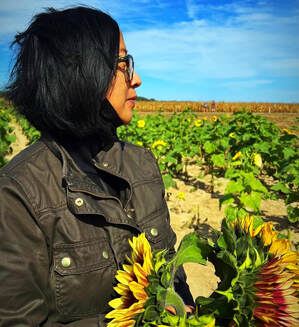 of writing [at least] a poem a day! On November 20, 2010, I began what would become this daily writing practice. At that time, I had no idea it would last this long. But it has proven to be something that I truly consider the highlight of every day—when I can drop down into even a brief pocket of writing space, where, as I've also realized, my preferred way of processing whatever the world gives me, is in the language of poetry. Here's what I said in the fifth year of my daily practice in an interview with Marly Youmans: "In a lull just before Thanksgiving last year [2010], I read Dave [Bonta]'s November 20 observation of a pileated woodpecker inching up the trunk of a locust tree “like a pawl on an invisible ratchet” and I thought: what a cool image, what a cool word—pawl—and immediately I wanted to turn it into a poem. […] I really didn’t intend for it to turn out into the daily “devotional” that it seems to have become, but now I’m thoroughly hooked. What I’m happiest about is how I’ve incorporated it into my daily writing practice, and that the simple rules I’ve set for myself seem to work well in terms of getting me to that place of focus and attention where there is the potential for making poetry happen. My rules are: I don’t have a fixed time for visiting The Morning Porch to read the latest line Dave’s written. But when I do, I try to respond immediately, without premeditation, composing as I go. I try not to belabor what I find in the starting “trigger”—because I don’t see myself obligated to respond via a form of poetic reportage. What happens instead is that the bit of image or language that first catches my eye or ear, meets what I bring to that moment (a combination of many things—what I may have been reading or remembering recently, what kinds of questions I might be asking that particular day). Finally, I try to do all of this in thirty minutes, forty max; I feel that if I go over this time limit I set for myself, I will be belaboring the whole enterprise too much." What I said then still holds true. I'm so grateful for anyone who might take time to read, and to Dave Bonta for generously sharing space at Via Negativa besides opportunities for fun collaborations. . * I've just created an account on Mastodon as ThePoetsLizard @ThePoetsLizard@universeodon.com —but my other social media accounts on FB and Instagram (@poetslizard) and Twitter (@ThePoetsLizard) are still active (& let's see for how long on the latter). Also, because I've been asked quite often lately— as far as I know, a new Poet Laureate of Virginia has not yet been appointed. (My two year term officially ended 30 June this year.) Thank you to the Academy of American Poets and my brilliant cohort of 2021-22 Poet Laureate Fellows ~
Our collaborative poem is now live! ... is the title of a long poem commissioned by the Hampton Roads Community Foundation for its 2022 Annual Report. The poem appears on page 34 of the Report booklet.
I'm so grateful to Cherise M. Newsome for the opportunity to converse about some of the important things that make Hampton Roads the community it is, for its diverse inhabitants. Today is my official last day as 20th Poet Laureate of the Commonwealth of Virginia (2020-22).
It’s truly been an honor, privilege, and joy to serve in this capacity, and I have so many of you to thank for your unstinting and generous support. I have a few more projects that I started during my term, that I’ll continue to see through to completion… because we need poetry now more than ever, and poetry is 4Evah amirite? Again, thank you/mil gracias/salamat/agyamanac unay— especially to my family, friends and students. The Poetry Society of Virginia The Academy of American Poets Mellon Foundation The MFA Creative Writing Program at ODU ODU College of Arts & Letters Old Dominion University Libraries The Muse Writers Center Virginia MOCA Norfolk ARTS Slover Library Filipino American National Historical Society (FANHS) Ralph Northam  Today, my daughter Gabriela read a new poem that I wrote for the Unveiling and Dedication of the Virginia Historical Marker Honoring Filipino Sailors, at the Philippine CulturalCenter, Virginia Beach. (I was unable to attend because I was giving a presentation at around the same time, for the Poetry Society of Virginia's Annual Conference/Festival.) The quote directly below this is from a 2017 article from the Filipino American National Historical Society(FANHS) website, and I used it as epigraph to the poem: “...several thousand Filipinos had been recruited into the US Navy and other branches of the military during the American colonial period ... As a result of increased need for personnel ... , the Navy began recruiting Filipinos at a rate of 1,000 a year in 1952; this was increased to 2,000 annually in 1954. Filipinos ... were limited to the steward rank until 1971, when an agreement was reached with the Philippine State Department to discard the practice. Stewards were responsible for providing cooking and cleaning for the ship and domestic service to officers and their families: food service, cleaning, laundry, and chores.” - from Filipino American National Historical Society (FANHS) online * * * WE, SEAFARERS by Luisa A. Igloria 20th Poet Laureate of the Commonwealth of Virginia Forward and bow, the hull’s built resistance to restive water; each port a pin on the scalloped edge of a map. As for leaving an archipelago— as if it was a simple matter of plowing into the foam, wave after wave turning like a page. What of home and history? No, not that one with a date and an explorer’s name attached to it, nor his naming of our ancestors’ lands after his king. Rather, those gridless skies above green canopies and mangrove forests, islands threaded through with rivers and streams, with fabled animals and birds whose songs could stun you into stone. You’d find, coming back to these histories, spaces where brooks sounded, as they cut through forests of fern and lady slipper orchids, as they fused with the nightly discourse of frogs. Sleeping volcanoes, houses on stilts or perched on hills, their roofs touched by the same sun that colored the fields and shimmered the fish which expeditions tagged, numbered, and held in vats-- They still float in the cool basement of a museum, part of the hundred thousand archives of our waters. Fortune, we are told, favors the bold. Fortune, we dreamed, waited at the end of months- long journeys as we set sail then for a fabled land. Passage extracts a price from everyone— some of us, paying with our labor on the very vessels that took us here. But here we are today, across the land, across the globe. We, architects of rafts and smaller vessels that narrow distances between shores. We, no longer just recruits, apprentices, messboys, servants, stewards. We, builders of galleons. We, who learned to captain our craft by the stars. |
"In these bruising days, Archives
March 2024
Categories |

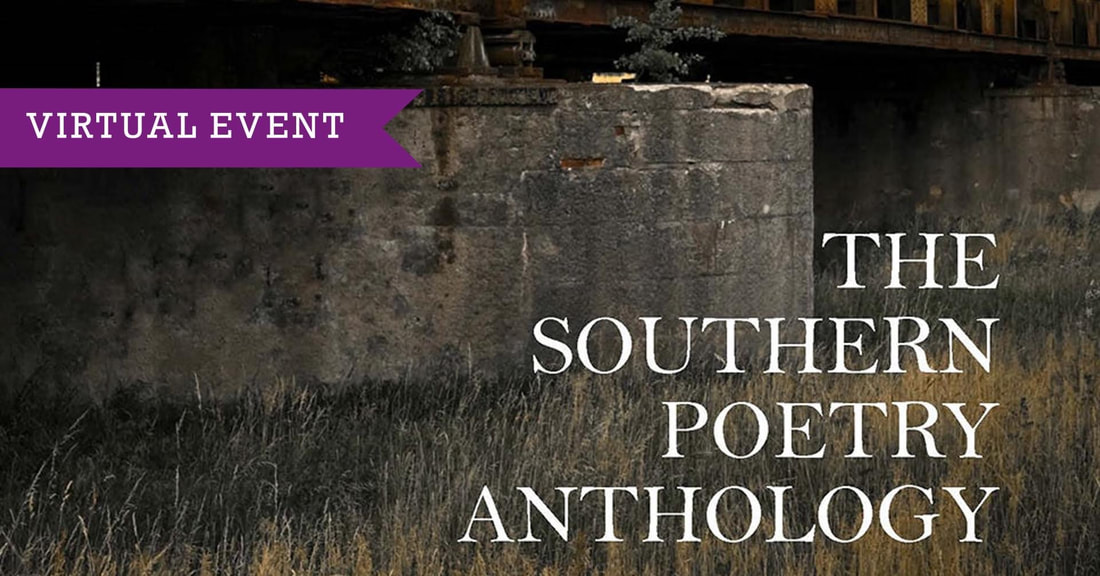
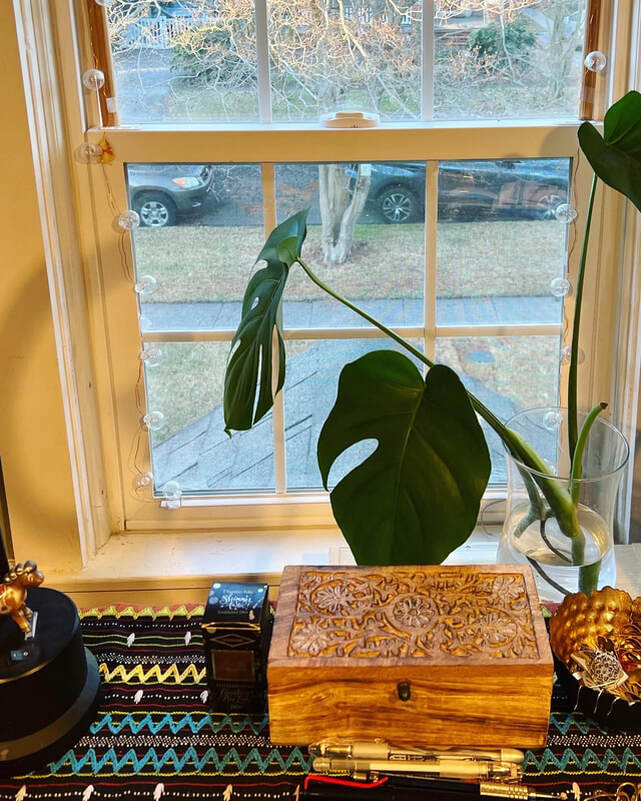
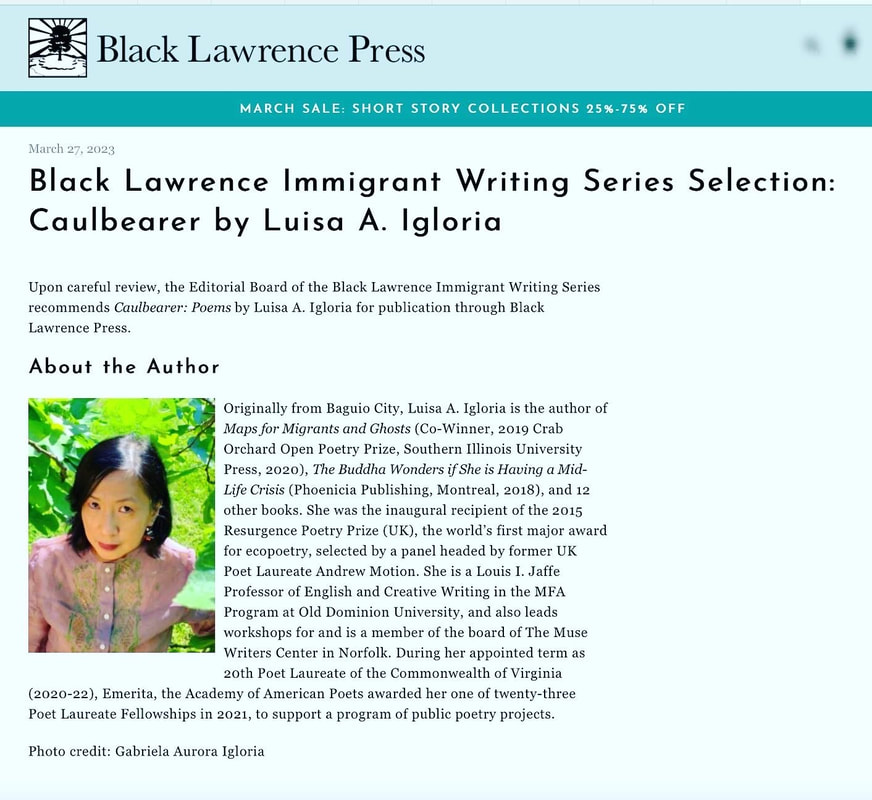
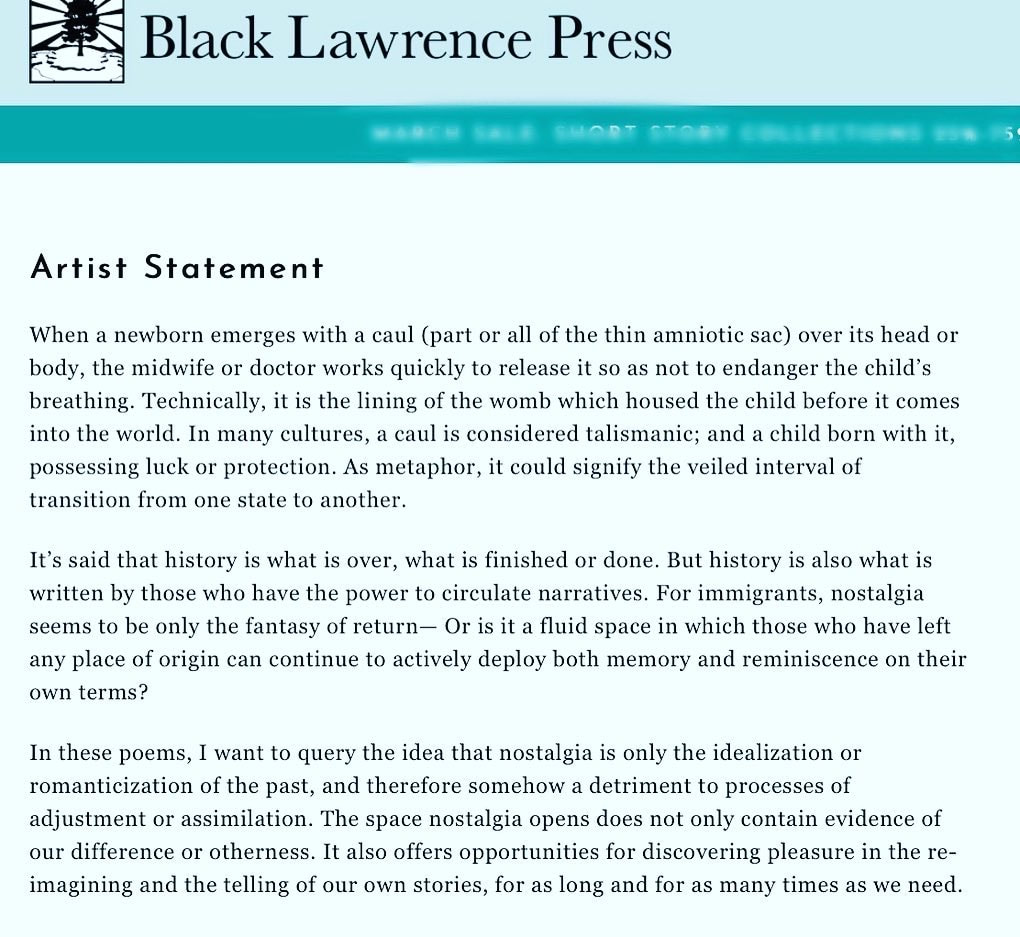
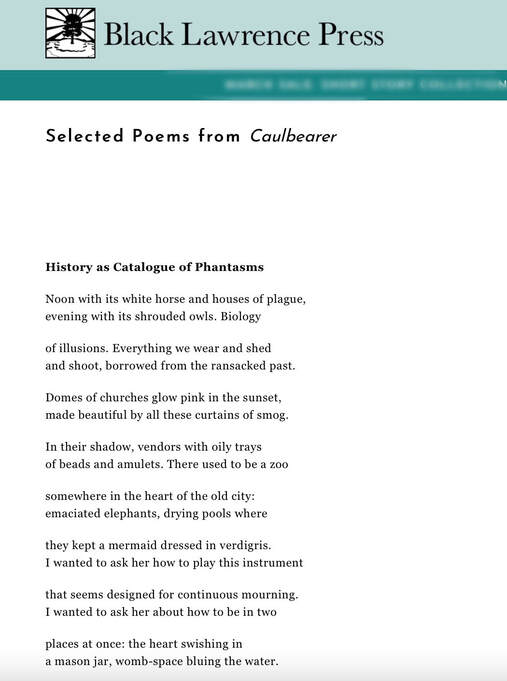
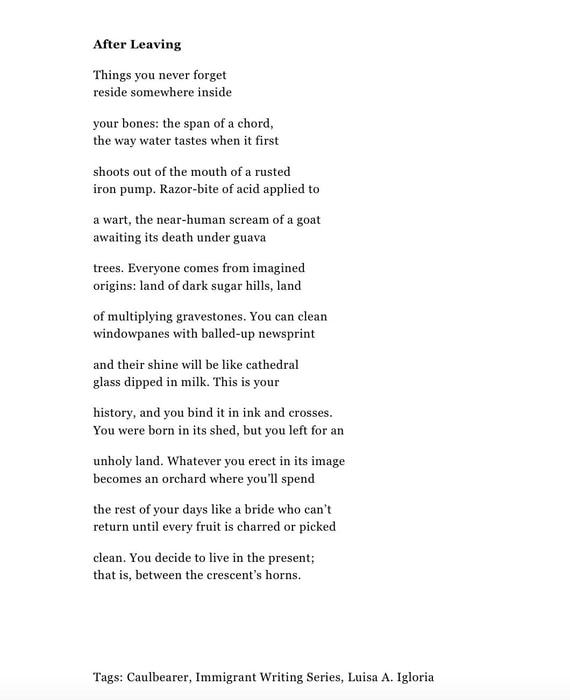
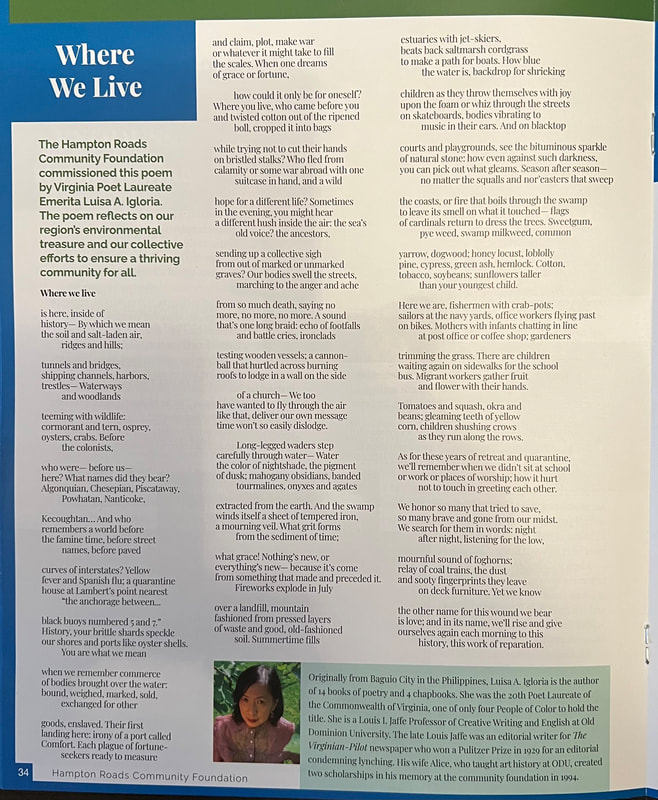
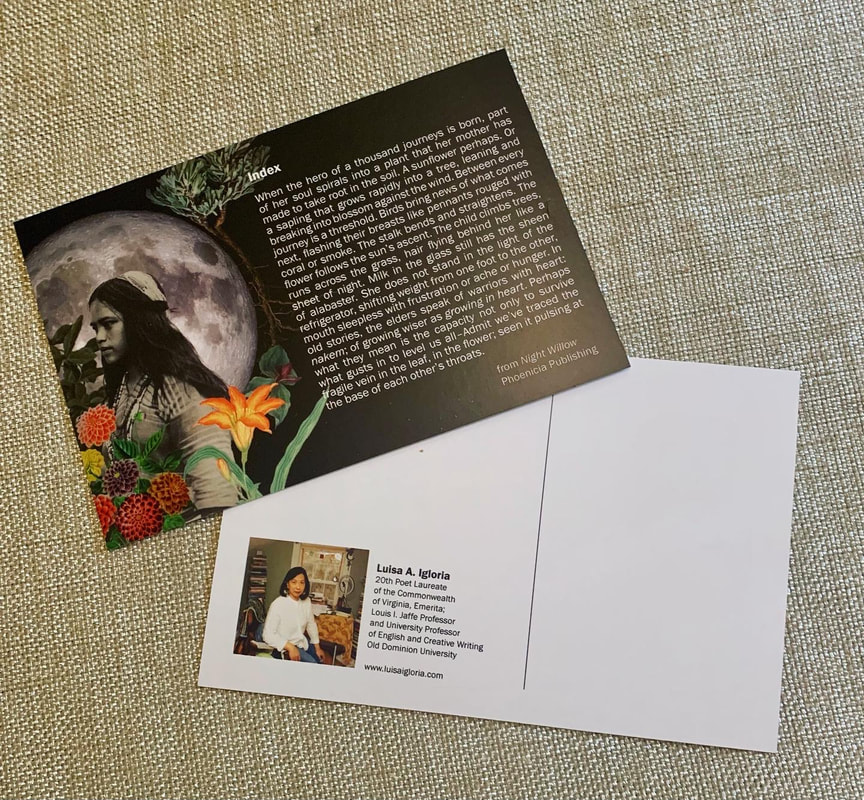
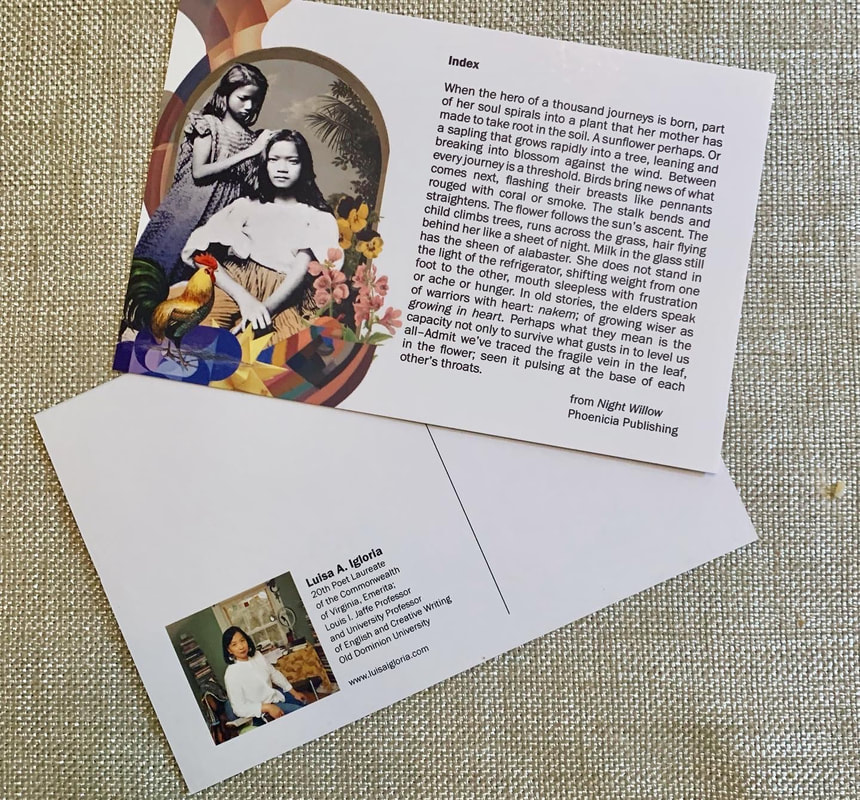
 RSS Feed
RSS Feed